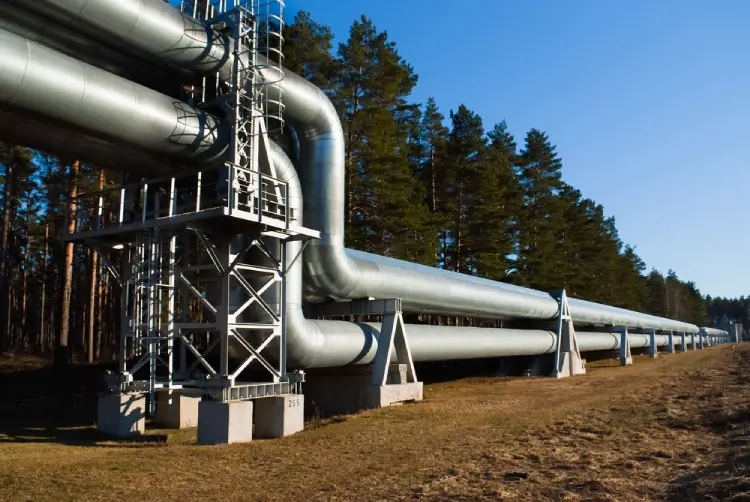
Politicians, central bankers and CEOs of the world’s biggest corporations all agree: a recession before the end of 2023 is a distinct possibility. So how should you invest in a recession?
It’s not long since Covid-19 dragged the world into the deepest recession since the second world war.
But already it looks as if another period of economic contraction is on the way.
Many fear the US Federal Reserve’s aggressive response to rising inflation will tip the US economy into another recession.
This could, in turn, create knock-on effects for a global economy that is already facing severe headwinds. In Europe, Russia’s invasion of Ukraine has choked the supply of energy and commodities, raising inflation and pushing the continent into a cost-of-living crisis.
On 3 August, the National Institute of Economic and Social Research said that it expected UK GDP to fall ‘slightly’ in the second half of 2022 and the first quarter of 2023 – and that the risks of a deeper recession were growing.
What is a recession?
There is no fixed definition for recession. In 1974, the American economist Julius Shiskin defined a recession as ‘two consecutive quarters of declining growth’, and this is still generally accepted today.
Different countries tend to favour different definitions. The UK, for example, adheres to Mr Shiskin’s definition but the United States does not, relying instead on calculations conducted by the National Bureau of Economic Research.
No two recessions are the same, but they often bear similar characteristics such as business failures and a tightening labour market. When multiple countries experience these conditions simultaneously it can trigger a ‘global recession’.
The effects of less severe recessions can be fairly contained. When the dotcom bubble burst in 2000, bringing almost a decade of economic expansion in the US to a close, the resulting recession was, by some measures, relatively mild. The brunt of the economic hit was taken by the stock market as the tech-heavy Nasdaq index saw more than 75 per cent of its value eviscerated. Meanwhile the wider economy escaped relatively unscathed, with real GDP falling just 0.6 per cent.
Economists suggest that recessions following sustained periods of economic expansion tend to be mild, as was the case in 1969 and 1990 which respectively followed the second and third-longest expansions in US history.
What causes a recession?
There are multiple reasons a recession might occur, and each provides clues about how different asset classes might respond.
Some recessions are exacerbated by sudden shocks to critical economic infrastructure or a collapse in consumer confidence, while others occur as an economy recalibrates after a long period of economic growth.
According to Rob Burgeman, investment director at Brewin Dolphin, 'recessions are like your children, they all have the same DNA but each has their own unique personality.'
How should you invest in a recession?
Recessions can hammer investors that are overexposed to certain types of assets, but they can also present opportunities to snap up underpriced assets.
Luigi Pigorini, who heads Citi’s Global Wealth unit in EMEA, told Spear’s earlier this year that a number of large Family Offices have already taken advantage of this volatility and taken some big positions.
In this article we will look at past recessions to see how a broad range of asset classes tend to perform during these periods:
- Equities
- Bonds
- Commodities and energy
- Safe Havens
How do equities perform during a recession?
Equity markets can be turbulent places during economic downturns.
According to Citi Global Wealth CIO David Bailin, the prospect of low growth tends to push people out of cyclical sectors, such as financials and technology, and into consumer staples such as healthcare and utilities.
This was the case in 2008, as AIG, XL Group, and Genworth Financial, three of the US’s biggest insurance firms declined in value by between 88 per cent and 97 per cent over the year, as the country's housing market collapsed.
Meanwhile firms selling cheap everyday items began reporting bumper profits. By the end of 2008, Dollar Tree was the S&P 500’s top performing stock with returns of 60 per cent as consumers across the country tightened their belts.
So how do investors determine which companies are positioned to withstand an incoming recession?
Identifying value in equity markets requires forensic analysis, explains Brewin Dolphin's Rob Burgeman. 'Take L'Oreal,' he says. 'When you go through their numbers it's clear they have a healthy balance sheet and are gearing quite low' (meaning they have a low debt-to-equity ratio).
'But importantly they sell everyday items and high-end products, which could make them resistant to declining demand.'
Bailin adds that ‘companies with sustainable and growing dividends and companies that have sustainable revenue growth without likely margin compression are areas where valuations are likely to be sustained’.
On the other hand, fortunes have been made by investors who are able to spot value left on the table. As investors flooded out of financial stocks in 2008, Warren Buffet began to build a $5 billion position in Goldman Sachs - shares which he would sell back to the firm for a $3.8 billion premium three years later.
How do bonds perform during a recession?
While stock prices can swing drastically during recession, bonds are typically considered to be more stable during economic downturns, offering investors fixed returns over a certain period.
This makes government bonds a bellwether for recession as investors rush for the relative safety of fixed income markets during times of economic stress.
One of the key indicators of an incoming recession is when the yield (or return) on longer-term bonds dips below that of shorter-term bonds. In theory, if you loan someone money for ten years, you should receive a higher interest rate than if you loan someone for three years. So, when a three-year bond is paying a higher interest rate than a ten-year bond it suggests something is wrong. Indeed, ‘inverted yield curves’ have appeared before each of the last four global recessions, and in April the yields on short and long term bonds inverted again.
But what does this mean for bond buyers? First, it is important to distinguish between then and now. This economic environment is different from any recent recession because we currently face high inflation coupled with low economic growth, a scenario known as ‘stagflation’.
'Fixed income fares much worse in a stagflationary scenario than a pure recession scenario,' explains Willem Sels, chief investment officer at HSBC Global Private Banking and Wealth. 'In the current environment, duration should be kept low, to shield portfolios against higher rates and against rate volatility.'
Duration is a measure of a bond’s sensitivity to interest rate changes. The longer the bond’s duration, the greater its sensitivity.
As the swell of rate rises subsides, however, some experts see value returning to the bond market. 'We believe that we are at or near peak interest rates in the United States,' says Bailin. 'In our view, intermediate, high-quality fixed-income investments will generate income and potential appreciation as rates normalise in 2023-24.'
Are energy and commodities a good investment during a recession?
During periods of economic stress, people rush to snap up assets that have historically been reliable in similar conditions.
'Throughout the 10 periods of the most acute market stress since 1970, gold produced a median return of 8 per cent,' says Kamran Moghadam, head of global macro and tactical asset allocation at Partners Capital. 'In only one of those 10 periods did gold lose money, and that was during the aggressive central bank rate hiking cycle of the 1980s when the Federal Funds rate was increased to 19 per cent.'
This time may be slightly different, says Sels. 'Interest rates are rising, and the dollar is appreciating, which are both negatives for gold. We think that gold is stuck in a trading range, without much direction – which still makes it a good diversifier for portfolios.'
While gold and precious metals are considered ‘safe havens’ during times of economic turbulence, energy markets are far more volatile. In a paper published earlier this year, Jeremy Grantham who has grown a reputation for predicting market bubbles, noted that 'major spikes in the price of oil like today's have always preceded or triggered recession.'

This volatility can create opportunities, however, and once again Warren Buffett has been quick to act. Buffett's Berkshire Hathaway began increasing its exposure to the energy sector early in 2022, and by August had built a $47 billion stake in some of the US's biggest oil and gas firms.
Buffett's firm now holds a $25.9 billion stake in oil and gas giant Chevron, which has seen its share price jump 30% since the beginning of the year as market disruption squeezed energy prices higher.
‘With high commodity prices being part of the reason for the high inflation, we think energy and materials should do much better than during a normal recession,' says Sels. 'In fact, in the stagflationary period of the 1970s, commodities were the top performing asset class.'
Are alternatives a good investment during a recession?
Hedge Funds can be a useful tool in a recessionary environment, since they can employ 'shorts' – which are effectively bets that the price of a given asset will decline. David Lee, chief investment officer at Singapore-based family office RheinGold has been building up his exposure to hedge funds over the past couple of months.
'Hedge Funds have underperformed long-only managers over the past decade, but they provide important diversification to portfolios during times of market dislocation.' While hedge funds lost nearly 6 per cent in the first half of the year according to HFR data, they have outperformed equity markets, with the S&P500 dropping nearly 20 per cent over the same period.
Meanwhile, ultra-wealthy investors are increasing their allocations to private equity. In early August 2022, Tiger 21, a group of HNW investors, released a member survey showing that 18 per cent of respondents had invested in private equity to address the economic downturn, with just 5 per cent saying they were selling their positions. While 15 per cent of respondents said they were buying public equities to address the downturn, 24 per cent said they were selling shares in publicly traded companies.
Historically, private equity has recorded its best returns during periods of economic recovery. After the dotcom bubble burst, for example, buyout funds recorded a median internal rate of return (IRR) of 25 per cent in 2001, 40 per cent in 2002, and 47 per cent in 2003.
In Bain's mid-year private equity report, analysts note that 'past lessons have taught [PE investors] the value of waiting out the storm'
A word of warning
Different assets perform different functions in a well diversified portfolio. Broadly speaking, equities capture the value generated by companies during a period of economic growth; bonds provide stable returns; while alternatives can diversify your holdings and reduce your risk over the long term.
However, attempting to time markets is dangerous. A recent study by Brewin Dolphin revealed how these tactics would have impacted the returns on a £10,000 investment made in the FTSE All Share Index between May 1989 and April 2022. If you had stayed invested throughout, the original sum would have grown to £140,287 before fees, assuming dividends were reinvested. If you had sold off and attempted to 'buy the dip' but got the timing wrong, missing the market's 30 best days over the period, your end investment would have grown to just £33,872.
Many of the considerations outlined above are best thought of as ‘tweaks at the margins’, says David Bailin. The Citi Global Wealth CIO adds: ‘We believe that overall core portfolios should remain invested throughout this whole period in order to continue collecting income from fixed income and dividends from equities, while capturing market upside in the event that recession does not occur or when markets ultimately turn up again.'
photo credit: Shutterstock






